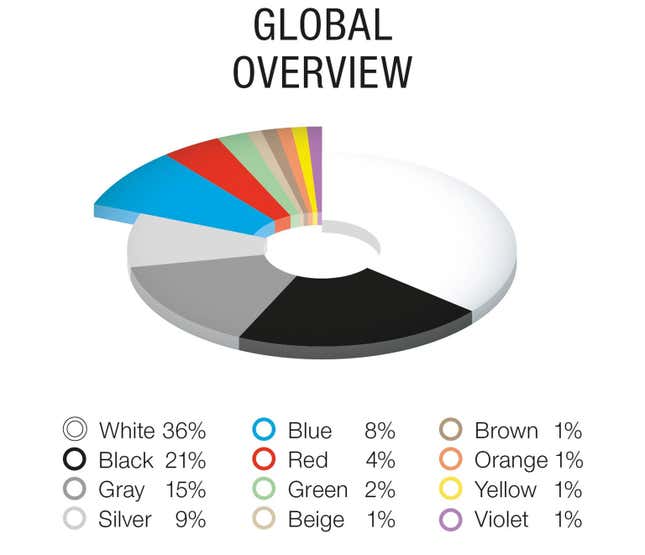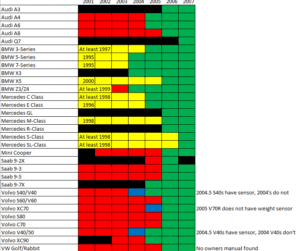Global Car Color Report Shows Americans Are Boring Losers, Should Not Be Allowed To Spec Their Own Cars

The annual Global Color Report was recently released by BASF, Germany’s largest chemical company, and shows 81 percent of new cars produced across the globe in 2023 were boring shades of white, black, gray, and silver. North America painted 80 percent of its vehicles white, black, silver, or gray, so we are actually slightly less homogenized than other regions, but the vast majority of cars on our roads are still boring shades. In other boring color news, North America saw silver surpass gray as the third most popular color last year. Go us.
White cars continue as the most popular color in every global region, with 34 percent of North American cars produced in white. Asia and Pacific regions had the highest percentage of white cars produced last year at 40 percent. Globally, 36 percent of cars produced in 2023 were painted white.
Image: BASF
North America saw 22 percent of its new cars leave the factory shod in black, tying with Asian and Pacific countries for the highest proportion of black cars, and surpassing the global average of 20 percent.
Behind the boring colors, blue was the next most popular color in North America. Just nine percent of cars produced in 2023 were blue, which is a lower percentage than in Europe, the Middle East, and Africa (EMEA) where 11 percent of new cars produced were painted blue. In Asia and Pacific regions, just six percent of cars produced in 2023 were blue, and South America saw only five percent.
North America had the highest global percentage of red cars produced though, at a whopping eight percent. South America had the next–highest percentage of red cars produced, at six percent. EMEA countries saw just five percent of new cars produced in red, and Asian and Pacific countries saw only four percent of their cars produced in red.

Image: BASF
After blue and red, there was a steep drop-off in colorful cars produced in North America, with a minute one percent painted green, one percent painted violet, and one percent painted beige. No other colors appeared on the charts for North America. Asian and Pacific countries produced the most diverse array of colors, including one percent of cars sold in the following colors; brown, beige, orange, violet, and gold.
As a person who is physically incapable of blending in due to my massive stature, I appreciate colorful cars that stand out from a crowd. My Mini is blue with white accents, but I would love to own a car in a tasteful shade of virtually any color. I think that if more people bought cars in expressive colors, they would be more likely to form a deeper connection with their ride. In a world of boring cars painted boring colors, it becomes easy to view a car as another appliance, but I think buying a colorful car encourages owners to feel more proud of their car, thus building a closer bond between owner and car. I’m not telling you to go buy a taxi-yellow car or a gimme-a-ticket red car, but just be open to something a little different.




